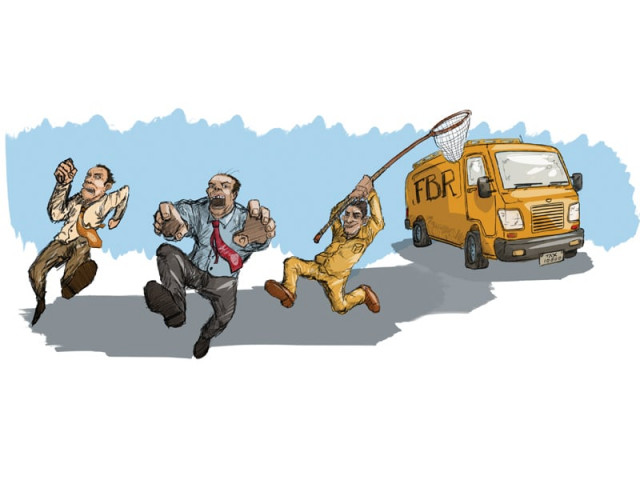New taxes likely after FBR misses revenue targets
Govt is scrambling to raise the tax-to-GDP ratio to a respectable level.

Govt is scrambling to raise the tax-to-GDP ratio to a respectable level. ILLUSTRATION: JAMAL KHURSHID
As the contribution of tax revenues to the economy slips below 9%, the FBR is contemplating levying a minimum Rs130 billion in new taxes, aiming to fulfil a key precondition of entering a loan programme with the International Monetary Fund (IMF), besides increasing the tax-to-GDP ratio to a respectable level.
The new measures will contribute only half a percentage of GDP, but have been deemed essential in achieving a revenue target of Rs2.444 trillion which will likely be assigned to the Federal Board of Revenue (FBR) for fiscal 2013-14, said senior government officials.
The recent rebasing of the economy and an expected minimum revenue shortfall of Rs331 billion has resulted in the tax-to-GDP ratio slipping below 9%, one of the lowest in the world, officials added.
Likely areas of taxation
The most lucrative option in front of tax authorities is increasing the rate of sales tax by 1% to 17%, which will generate close to Rs50 billion in additional revenues. However, such a move will be highly unpopular, and officials say that increasing sales taxes will fuel inflation. Therefore, the option will be left for the new government to decide on.
Another measure under discussion is the reduction of federal excise duty slabs on cigarettes from three to two, which will generate an additional Rs12 billion in revenues.
The FBR is also planning to make imports more expensive by increasing the tax rates on all types of imports by 1%, officials disclosed. It also intends to withdraw all zero ratings and levy a 1% tax where no taxes are charged at the moment.
The FBR is considering increasing the tax rate for the highest individual income category to 22-23% from the current 20%. It is also considering keeping tax exemptions for annual incomes up to Rs400,000.
The math
The FBR expects to collect Rs2.05 trillion at best for this year, which is just 8.7% of GDP. That sum is just 8% above the previous year’s collection and almost equal to the inflation rate: this means that, in real terms, the FBR has done almost nothing for the entire year as far as enhancing the tax net is concerned.
If the new government decides to take other measures – as desired by the IMF – the sum total of new revenues raised will come close to Rs180 billion (equal to 0.7% of GDP), and next year’s tax target will subsequently be increased to Rs2.5 trillion.
Authorities are likely to set next year’s economic growth target at 4.4%, while the inflation target may be set at 8% or 8.5%. Thus nominal GDP growth (non-inflation adjusted) will automatically reap a benefit of Rs267 billion without the levy of any new tax, which is 13% higher than the anticipated collection for this year, they added.
By adding that Rs267 billion to the Rs2.05 trillion collected in taxes this year, the nation will realise Rs2.317 trillion in revenues without any extra efforts. To achieve the Rs2.44-2.5 trillion collection target, therefore, revenue authorities will require raising new taxes to the tune of Rs130-180 billion.
External pressures
During negotiations with the IMF for a new bailout programme, the IMF asked Pakistan to make revenue and expenditure adjustments equal to 1-1.5% of GDP every year, during the three-year period of the new programme. This measure aims to increase the abysmal tax-to-GDP ratio to close to 13%.
Officials say that as far as next year’s tax target is concerned, any new government will have little room to make changes. However, the new leadership can choose from among the taxation options available in order to achieve the target.
According to a senior official of the finance ministry, the country will have to make an adjustment of at least 1% of GDP. The most major component of such an adjustment will have to be contributed from the taxation side, with authorities ideally aiming to increase the tax-to-GDP ratio to a more respectable 9.3-9.5% in the next fiscal year.
According to an FBR official who participated in negotiations with the IMF, the lending agency has clearly told Pakistan that tax increases should come from changes in national policy. This suggests that the FBR will have to take significant measures to increase revenues, irrespective of which party takes power in the elections scheduled on Saturday.
Published in The Express Tribune, May 7th, 2013.
Like Business on Facebook to stay informed and join in the conversation.



















COMMENTS
Comments are moderated and generally will be posted if they are on-topic and not abusive.
For more information, please see our Comments FAQ